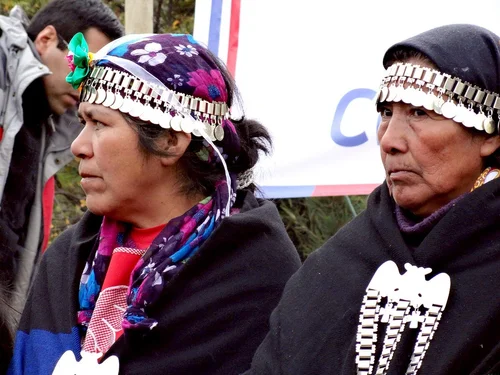03 Jul 2021
Global
GI-ESCR and partners draw attention on key challenges for the rights of indigenous women and girls
GI-ESCR, jointly with Observatorio Ciudadano and ProDESC, submitted a joint written contribution to the Committee on the Elimination of Discrimination against Women (CEDAW Committee), at the general discussion the Committee organised to launch the debate and receive input for a new general recommendation on the rights of indigenous women and girls, aiming to advance women’s rights and achieve substantive gender equality. The written submission aims to highlight the crucial importance of the effective participation, consultation and consent of indigenous women and girls in climate change mitigation measures and strategies.

Mapuche women in Chile. Picture: Conadi.
The three partners, namely GI-ESCR, El Observatorio Ciudadano and ProDESC, made a joint submission as they work in Chile and Mexico, two of the countries in the Latin American region where indigenous women and girls have been most affected by energy transition policies and frameworks that do not respect their rights to land, natural resources and full and effective participation in decision-making processes. It also underscores that indigenous women and girls are key agents of social change, possessing traditional knowledge and expertise on energy resource management in their homes and communities. Their views and perspectives are essential to transform the basis of existing inequalities and to combat extractive and other harmful practices in the production, distribution and use of renewable energy.
The green revolution represents a unique opportunity to bridge the gaps of legal protection for indigenous women and girls, valuing their traditional knowledge and the role that they play as key agents of social change and in the preservation of natural resources and local ecosystems.
Indigenous women and girls in the Chilean process
Address the incorporation of women and girls in the development of renewable energy projects is a vital issue amid the Chilean constitutional process. This issue allows examining the confluence of gender approach and environmental democracy in the broader context of protecting nature.
As Elisa Loncón, president of the Constituent Convention, highlighted, the new Constitution must be written for “the rights of Mother Earth, the water’s rights. Women’s rights. The children’s rights”. All of them are closely related from a sustainability and human rights perspective and cannot be isolated. Thus, the constitutional guaranteeing of the participation of all communities, especially indigenous women and girls, is a crucial element to achieve the profound social change that Chile aspires to.


